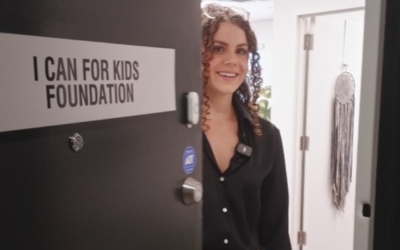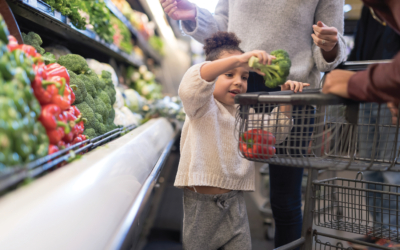When we initiated our new grocery gift card program in 2020, we were fortunate to attract the attention of researchers at the University of Calgary (U of C) who wanted to investigate the impacts of our innovative approach. This study is the first of its kind in Canada. In this blog, we provide a quick summary of the ground-breaking outcomes published in this article from the esteemed Public Health Nutrition journal.
Why did we do this research?
The researchers at U of C were keen to explore the experiences and perceptions of the recipients and the social service agencies who participate in our program. iCAN wanted to learn whether our year-round grocery gift card program resulted in advantages and benefits that our former summer food program could never achieve.
What did the researchers do?
- conducted in-depth interviews with recipients and agency partners until they no longer heard any new perspectives or experiences
- gathered insight from a total of 37 recipients and 17 agency partners
Who did the researchers interview?
The researchers asked our agency partners to recruit program recipients who:
- came from diverse cultural backgrounds and household sizes
- regularly shopped for food and prepared meals for their families
- were the primary caregiver of the children in their family or household
- accessed support through both the iCAN grocery gift program and at least one free food program in Calgary
The researchers recruited agency partners who:
- provided services to a diverse mix of food-insecure families in Calgary
- worked with iCAN before and during the transition from summer food provision to year-round grocery gift cards
- also referred food-insecure households to food programs
What did the researchers learn?
All the study participants preferred to access the grocery gift card program over food banks and food programs, including the former iCAN summer food program. The researchers identified three major themes to highlight in the published article:
1. Autonomy & Dignity
Compared to traditional food programs, our recipients emphasized how grocery gift cards empower them with:
- more control over the foods they choose to provide their families
- the ability to shop in local grocery stores
- total freedom to shop at a convenient time and location
- less household stress about money and food
- greater privacy and dignity through access to discreet and respectful support
A single mother of two children shared her feelings: “Using a grocery gift card makes me feel like I’m contributing something for my kids. With grocery gift cards, you’re able to go out and pick out your own food. It just makes you feel human. It makes me feel like I just did that myself. I didn’t have somebody do it for me.”
2. Diet Quality & Food Skills
The researchers learned that grocery gift cards offer more opportunity to improve diet patterns because families can:
- afford larger amounts of fresh fruit, vegetables, and meats
- buy higher quality and nutrient-dense foods
- choose specific foods that meet their unique cultural, religious, and health needs
- prepare more home-cooked meals when they can afford all the ingredients
- inspire their children to meal plan and buy all the ingredients to prepare a specific recipe
A single mother described the benefits for her son: “My child is very intrigued with baking and cooking. I always had all the tools for it, but I just didn’t have the money to go get all the ingredients. So now he plans meals with the grocery gift cards.”
3. Program Strengths & Opportunities
The researchers noted how our grocery gift card model:
- provides an opportunity for agency partners to develop stronger rapport with recipients
- encourages recipients to ask agencies for other forms of help, such as skill-building programs, job searching, and mental health support
- reduces agency partner workload because they don’t have to manage food hampers
- establishes a barrier-free program that is easy for recipients to access and understand
An agency partner shared the advantages of gift cards: “They’re genuinely happy when they have grocery gift cards because they’re more in control of what they can buy. And that’s where the trust also begins. They can trust us that we are genuinely here to help. We’ve had families come back and be like: Hey, you know, thank you so much for that time you helped me. I am also struggling with this. Can you help me because you’ve helped me before?”
How did the research help iCAN?
By early 2021, iCAN took specific actions based on the study results to enhance the impact of our program. As recommended in the published article, we have added new processes to:
- provide specific guidance for our agency partners on how to best identify the families at highest risk for food insecurity based on Canadian statistics
- inform each agency partner how many grocery gift cards they will receive each month for the entire year so they can establish an equitable process to distribute this total value among families in greatest need
- focus on raising more funds and securing more grants to meet the growing demand and preference for our grocery gift cards
Thank you to the researchers!
We extend our gratitude to the primary researcher, Yun Yun Lee, and her supervisor, Dr. Dana Olstad, for their outstanding leadership, collaboration, and academic rigor. Their expertise ensured that our study truly represented the voices of food-insecure families and effectively captured the valuable insights of our agency partners. You can also discover more compelling research results on our website.
To join iCAN’s expanding list of sponsors and champions, check out the different ways you can get involved or donate.
To learn more about I Can for Kids and their unique approach to childhood food insecurity, visit www.icanforkids.ca
About Donald Barker
Donald Barker has worked as a registered dietitian for more than 25 years. He also has a professional background in communications and has long advocated for populations who face adverse, unjust, or systemic barriers that lead to higher rates of poor social, mental, emotional, and physical health outcomes. Donald currently volunteers as an Advisor with iCAN to support our transition towards evidence-based approaches that help improve the well-being of children in Calgary who live in low-income and food-insecure households.
About I Can for Kids Foundation
I Can for Kids works closely with multiple agency partners to target and distribute grocery gift cards to food-insecure families who are most in need. The iCAN grocery gift card program is a more dignified and inclusive approach to dealing with food insecurity, allowing families to shop where everyone else shops and to choose foods that are appropriate for their health and cultural needs. Explore their website to discover more about iCAN’s impact over the years.
For more information and media inquiries, please contact iCAN Executive Director, Bobbi Turko at bobbi@icanforkids.ca.




